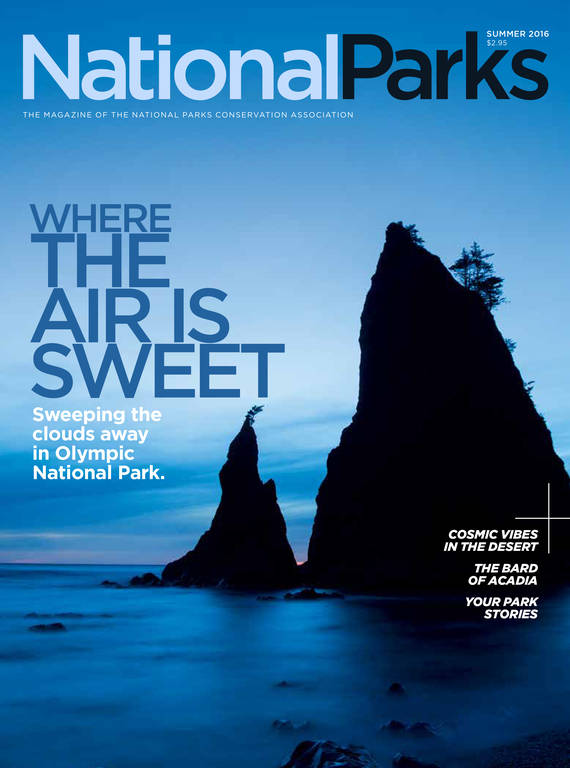Summer 2016
Words and Stones
On the trail with Acadia’s new poet laureate.
On a cold, sunny day in Acadia National Park, Christian Barter crunched through late-March snow — unseasonable, even for northern Maine. A trail site supervisor with over 20 years’ experience in the park, he was trying to show me his crew’s handiwork near Sieur de Monts Spring, but the previous day’s nor’easter had interfered.
“This trail has beautiful stone steps, but all you can see is snow!” he said, laughing.
He pointed out a springhouse and shallow pool conceived by George B. Dorr, “father” and first superintendent of Acadia, who settled on Mount Desert Island in the late 1800s and designed many of the highly crafted paths in the 155-mile trail system that Barter’s crew rehabilitates and maintains. It was Dorr, with a handful of others, who pushed for Acadia’s original national monument designation a century ago. In a poem called “The Stepping Stones,” Barter describes the hard-lobbying Dorr as he appears in an old photograph: “he looks / like a normal man: distracted, tired, / trapped in the era’s costume.”
Barter, it turns out, is an accomplished poet — with two acclaimed poetry collections (and a third book forthcoming), stints at writers’ colonies and a Princeton fellowship on his resume. Recently, his two careers merged: As part of this year’s centennial celebration for both Acadia and the National Park Service, Barter has been named Acadia’s first poet laureate. This summer he will participate in events sponsored by Acadia and partner organizations like the Bangor Public Library and College of the Atlantic, where he has taught classes. He’s also working on a poem to commemorate the park’s milestone (an “occasional” work, as it’s known), which he hopes to share at a public reading in August.
Writers from Ralph Waldo Emerson to Edward Abbey have drawn inspiration from America’s natural spaces, and more than 50 national parks offer residency programs for artists, but laureateships are unusual. Laura Hope-Gill was appointed the first poet laureate of the Blue Ridge Parkway in 2010, and back in 1971, Ella V. Costner was named poet laureate of the Smokies by the state of Tennessee. A few sites have unofficial poets, and that’s about it for park bards.
Barter, who is 47, has welcomed the rare appointment, which he’ll hold through 2016. At a Bar Harbor coffee shop, he was affable and articulate. Tall, wearing black-framed eyeglasses and a skullcap on his shaved head, he looks like a hip monk. But his sturdy shoulders betray his day job, which, along with scouting and planning new projects, often involves digging ditches or hefting rocks with 4,000-pound-capacity winches.
Acadia’s system of hiking trails and footpaths, among the most intricate in the country, includes huge amounts of “dry” masonry — stone without mortar. Barter has grown to love working with stone. “It’s demanding, it’s heavy, it’s unforgiving,” he said. “You have to meet it on its terms.” And of course, the idea that a well-designed trail or flight of hand-hewn granite steps is an enduring work of art is not lost on a poet: “There’s a chance it could be here in 2,000 years. That really appeals to me.”
John Kelly, Acadia’s management assistant and public information officer, said that when the centennial task force floated the possibility of a poet laureate, Barter was the obvious choice. “Chris is out there every day getting his hands dirty,” he said. “It’s perfect to have someone in this position with a very physical connection to the park.”
A Maine native, Barter grew up in Sullivan, a small town where his mother, a folk musician, and his stepfather, a carpenter, had moved to live off the land. Raised in a liberal, intellectual family, Barter read constantly and “scribbled stories” as a kid, but he said the natural world was easy to take for granted. “I worked in the garden every day and chopped wood. It wouldn’t have occurred to me to go hiking. The woods were all around me.”
Barter attended Bates College, where he studied music. “It was the best training ground for poetry” because it honed his ear for rhythm, he said. As an undergraduate, he spent summers in Bar Harbor, though back then Acadia was barely on his radar. But when he learned from a friend that park jobs paid two bucks more than the pickup landscaping he was doing, he applied for a maintenance position and ended up on the trail crew. “I didn’t know how lucky I was,” he said.
Each summer, Barter returned as a seasonal worker, and all the while, he wrote poems. He jotted bits of lines in the backs of the notebooks he carried to catalog trails. Many of the phrases were “orphans,” he said, but eventually, some coalesced into finished verse. During that time, he earned an MFA in writing from Vermont College of Fine Arts and began publishing work in prestigious journals including Ploughshares and The Georgia Review.
A turning point came in his late 20s, when he was offered a fully funded spot in a doctoral program just after landing a permanent position on the trail crew. It was a tough decision, but he passed on the PhD. After nearly a decade, the job he’d once considered a dependable placeholder had begun to feel like part of his identity. “I realized this is what I do,” he said.
Poet’s Words
Juggling his two vocations, he admits, has never been easy. “It’s not really a balance. You’re always robbing from one or the other.” During Acadia’s peak season, when he co-manages a crew of around 30, plus volunteers, Barter writes just a few mornings each week, but his annual furlough — anywhere from two weeks to five-and-a-half months — allows him longer stretches to focus on poems. He also tackles nonliterary projects during those breaks: Currently, he’s building a house where he and his partner will eventually live. When his art frustrates him, he said, returning to the woods keeps him grounded. “I’m out there at 6 in the morning with the ducks and deer,” he said.
As we talked, Barter dropped in quotes from Saul Bellow, Victorian art critic John Ruskin and Robert Frost, whose spare, earnest verses are touchstones for him. “I’m kind of a traditionalist,” he said. Elizabeth Bishop and Robert Lowell are other favorites. The poets he admires most, he said, are “speaking from the heart with some degree of sincerity.”
In his own poems, that influence is clear. Barter’s first book, “The Singers I Prefer,” and his second collection, “In Someone Else’s House,” are full of lean lines that hum with honesty — even when the voice turns playful or wounded or comically cranky. Although his focus primarily has been on the personal, Barter said as he’s gotten older, “the landscape is coming into my poetry more and more.” When it does, the rough beauty of coastal Maine takes on vivid life: “this bay / of roiling, these mountains standing / stock in their hunched files … ferns, swamp grass and tiny bush stems / all quivering like mad / in their little cliques … ”
“His work is very disciplined,” said Jack Russell, co-chair of Acadia’s centennial task force and a longtime member of the park’s volunteer trail crew. “The diction is almost conversational, but as you would want in a fine poem, every word matters.” In one of Russell’s favorite poems, “Stars,” Barter savors the night sky: “Between the bare branches left / hanging like threads on cut shirt sleeves, stars tingle, / whole galaxies for the leaves that now fill ditches.”
For Barter, the best poems are conduits to a larger experience. “At the end of a really good poem, you’re left with the place that it took you,” he said. “The poem takes you there and drops you off.” Not surprisingly, he’s found this phenomenon applies to his park work, too. “I think with trails it’s the same way,” he said. “When you do your work well, the thing you’ve done kind of disappears.”

National Parks
You can read this and other stories about history, nature, culture, art, conservation, travel, science and more in National Parks magazine. Your tax-deductible membership donation of $25 or more entitles…
See more ›Lately, perhaps because of his new title, Barter has been thinking more about art as a form of stewardship. “There’s maybe an ethical responsibility for artists to honor what we haven’t destroyed yet.” Beyond the stunning scenery, protected lands like Acadia can remind us of our impact by showing us the world with little human interference, he said, and they can move us to interfere less. “It’s a place where you have the opportunity to be humbled, and you can seize it if you want to,” he said.
Before we parted ways, Barter showed me Jesup Path, a “semi-floating” wooden boardwalk that spans part of Great Meadow, a large wetland at the base of Dorr Mountain. Barter’s crew built the structure; he described how they laid it down in sections, one piece after another, falling into a rhythm. The walkway stretches out of sight through an arch of tall trees.
Standing ankle-deep in snow among the birches, I listened to the wind for a few beats. The sky was pure blue. Something Barter had told me earlier — about how wild spaces help us “remember where we are” — was still in the back of my mind. It’s a beautiful place, I finally told him.
“It’s a nice spot,” he agreed. Then he gestured at another trail. “Here, hang a left,” he said, and we started back toward the heart of the park.
About the author
-
 Dorian Fox Contributor
Dorian Fox ContributorDorian Fox is a writer and freelance editor whose essays and articles have appeared in various literary journals and other publications. He lives in Boston and teaches creative writing courses through GrubStreet and Pioneer Valley Writers' Workshop. Find more about his work at dorianfox.com.



